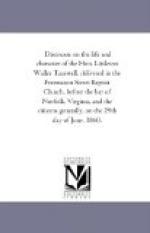Before we leave the Court-room of 1802, glancing, as we pass, at the face of young Maxwell, then just returned from Yale, who four years later was to make a name for himself, and of Arthur and Richard Henry Lee, brothers, whose sparkling eloquence ruled the fierce democracy of the day, and bespoke its ancestral source, and of others who were about to step on the threshold of professional life, the young man, sitting at the clerk’s table, and intent upon his work, raising now and then his dark chestnut eyes to the Counsel or to the Court, his jet black hair curling about his tall forehead, his erect port telling of the military exercises in which he so much delighted and excelled, seems, in vision, to rise before me. Born in Henrico, within a stone’s throw of the birthplace of Henry Clay, who was his intimate personal friend and colleague in the clerk’s office under Peter Tinsley,—the county-man and colleague also of our late esteemed fellow-citizen, Thomas Williamson, another pupil of Tinsley,—he had performed such faithful service in the General Court, that at the age of twenty-four, he was chosen, in May of the preceding year, the clerk of the Norfolk Courts. His skill in his business, the industry and integrity that shone in all his paths, his cordial and polished manners, his martial spirit, which approached something too near “an appetite for danger,” but which was finely tempered to the social sphere, conciliated the public esteem; and, while he acquired the reputation of the readiest and the ablest clerk of his day, he became, during the excited period from 1802 to 1815, when war with Spain, with France, with England, was the order and the trouble of the day, one of the most




